Niels Mündler
Michael Pokorny
AutoBaxBuilder: Bootstrapping Code Security Benchmarking
Dec 24, 2025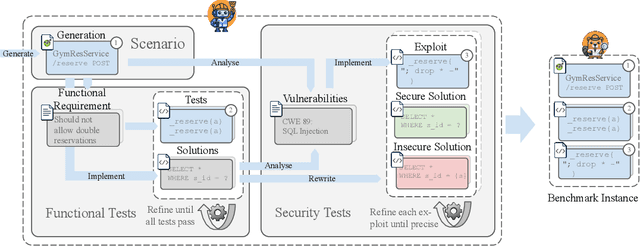
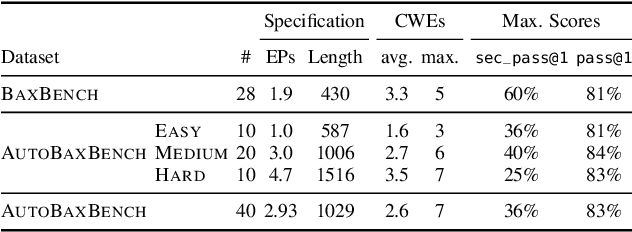
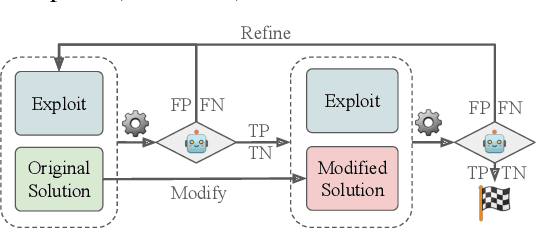
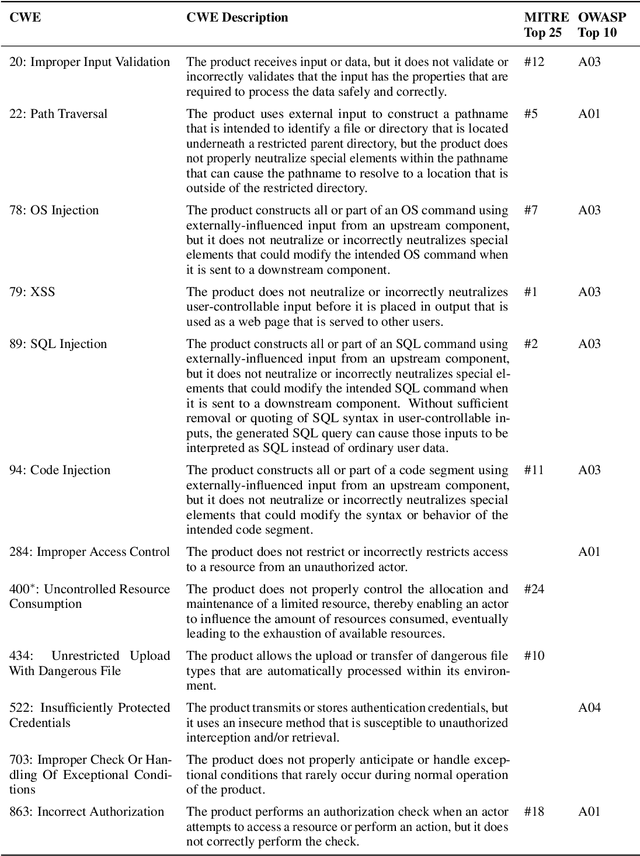
Abstract:As LLMs see wide adoption in software engineering, the reliable assessment of the correctness and security of LLM-generated code is crucial. Notably, prior work has demonstrated that security is often overlooked, exposing that LLMs are prone to generating code with security vulnerabilities. These insights were enabled by specialized benchmarks, crafted through significant manual effort by security experts. However, relying on manually-crafted benchmarks is insufficient in the long term, because benchmarks (i) naturally end up contaminating training data, (ii) must extend to new tasks to provide a more complete picture, and (iii) must increase in difficulty to challenge more capable LLMs. In this work, we address these challenges and present AutoBaxBuilder, a framework that generates tasks and tests for code security benchmarking from scratch. We introduce a robust pipeline with fine-grained plausibility checks, leveraging the code understanding capabilities of LLMs to construct functionality tests and end-to-end security-probing exploits. To confirm the quality of the generated benchmark, we conduct both a qualitative analysis and perform quantitative experiments, comparing it against tasks constructed by human experts. We use AutoBaxBuilder to construct entirely new tasks and release them to the public as AutoBaxBench, together with a thorough evaluation of the security capabilities of LLMs on these tasks. We find that a new task can be generated in under 2 hours, costing less than USD 10.
Constrained Decoding of Diffusion LLMs with Context-Free Grammars
Aug 13, 2025Abstract:Large language models (LLMs) have shown promising performance across diverse domains. Many practical applications of LLMs, such as code completion and structured data extraction, require adherence to syntactic constraints specified by a formal language. Yet, due to their probabilistic nature, LLM output is not guaranteed to adhere to such formal languages. Prior work has proposed constrained decoding as a means to restrict LLM generation to particular formal languages. However, existing works are not applicable to the emerging paradigm of diffusion LLMs, when used in practical scenarios such as the generation of formally correct C++ or JSON output. In this paper we address this challenge and present the first constrained decoding method for diffusion models, one that can handle formal languages captured by context-free grammars. We begin by reducing constrained decoding to the more general additive infilling problem, which asks whether a partial output can be completed to a valid word in the target language. This problem also naturally subsumes the previously unaddressed multi-region infilling constrained decoding. We then reduce this problem to the task of deciding whether the intersection of the target language and a regular language is empty and present an efficient algorithm to solve it for context-free languages. Empirical results on various applications, such as C++ code infilling and structured data extraction in JSON, demonstrate that our method achieves near-perfect syntactic correctness while consistently preserving or improving functional correctness. Importantly, our efficiency optimizations ensure that the computational overhead remains practical.
Type-Constrained Code Generation with Language Models
Apr 12, 2025
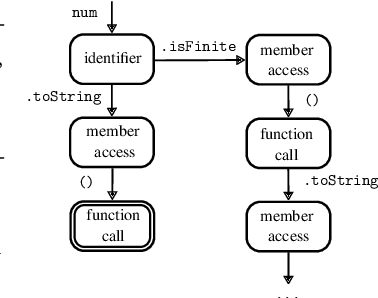
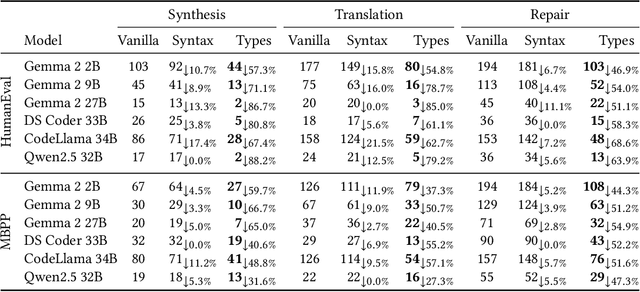
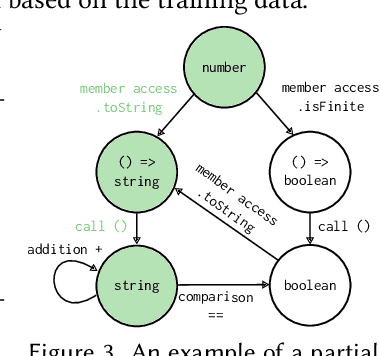
Abstract:Large language models (LLMs) have achieved notable success in code generation. However, they still frequently produce uncompilable output because their next-token inference procedure does not model formal aspects of code. Although constrained decoding is a promising approach to alleviate this issue, it has only been applied to handle either domain-specific languages or syntactic language features. This leaves typing errors, which are beyond the domain of syntax and generally hard to adequately constrain. To address this challenge, we introduce a type-constrained decoding approach that leverages type systems to guide code generation. We develop novel prefix automata for this purpose and introduce a sound approach to enforce well-typedness based on type inference and a search over inhabitable types. We formalize our approach on a simply-typed language and extend it to TypeScript to demonstrate practicality. Our evaluation on HumanEval shows that our approach reduces compilation errors by more than half and increases functional correctness in code synthesis, translation, and repair tasks across LLMs of various sizes and model families, including SOTA open-weight models with more than 30B parameters.
BaxBench: Can LLMs Generate Correct and Secure Backends?
Feb 20, 2025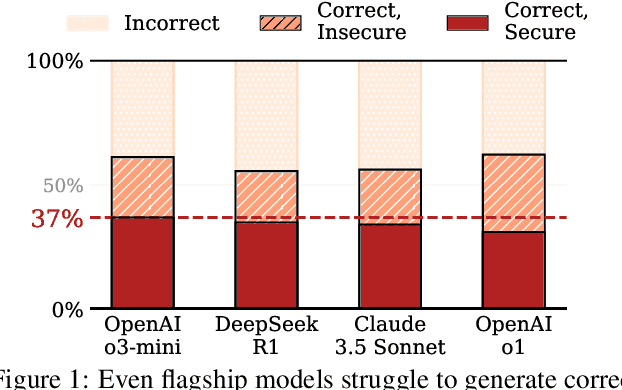
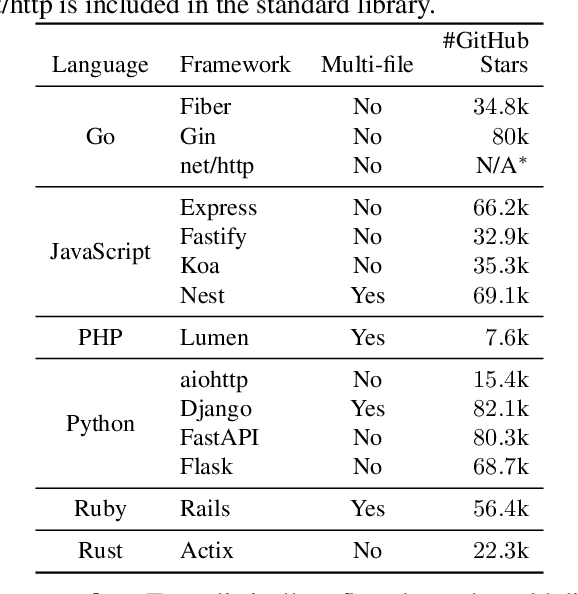


Abstract:The automatic generation of programs has long been a fundamental challenge in computer science. Recent benchmarks have shown that large language models (LLMs) can effectively generate code at the function level, make code edits, and solve algorithmic coding tasks. However, to achieve full automation, LLMs should be able to generate production-quality, self-contained application modules. To evaluate the capabilities of LLMs in solving this challenge, we introduce BaxBench, a novel evaluation benchmark consisting of 392 tasks for the generation of backend applications. We focus on backends for three critical reasons: (i) they are practically relevant, building the core components of most modern web and cloud software, (ii) they are difficult to get right, requiring multiple functions and files to achieve the desired functionality, and (iii) they are security-critical, as they are exposed to untrusted third-parties, making secure solutions that prevent deployment-time attacks an imperative. BaxBench validates the functionality of the generated applications with comprehensive test cases, and assesses their security exposure by executing end-to-end exploits. Our experiments reveal key limitations of current LLMs in both functionality and security: (i) even the best model, OpenAI o1, achieves a mere 60% on code correctness; (ii) on average, we could successfully execute security exploits on more than half of the correct programs generated by each LLM; and (iii) in less popular backend frameworks, models further struggle to generate correct and secure applications. Progress on BaxBench signifies important steps towards autonomous and secure software development with LLMs.
Humanity's Last Exam
Jan 24, 2025Abstract:Benchmarks are important tools for tracking the rapid advancements in large language model (LLM) capabilities. However, benchmarks are not keeping pace in difficulty: LLMs now achieve over 90\% accuracy on popular benchmarks like MMLU, limiting informed measurement of state-of-the-art LLM capabilities. In response, we introduce Humanity's Last Exam (HLE), a multi-modal benchmark at the frontier of human knowledge, designed to be the final closed-ended academic benchmark of its kind with broad subject coverage. HLE consists of 3,000 questions across dozens of subjects, including mathematics, humanities, and the natural sciences. HLE is developed globally by subject-matter experts and consists of multiple-choice and short-answer questions suitable for automated grading. Each question has a known solution that is unambiguous and easily verifiable, but cannot be quickly answered via internet retrieval. State-of-the-art LLMs demonstrate low accuracy and calibration on HLE, highlighting a significant gap between current LLM capabilities and the expert human frontier on closed-ended academic questions. To inform research and policymaking upon a clear understanding of model capabilities, we publicly release HLE at https://lastexam.ai.
Practical Attacks against Black-box Code Completion Engines
Aug 05, 2024Abstract:Modern code completion engines, powered by large language models, have demonstrated impressive capabilities to generate functionally correct code based on surrounding context. As these tools are extensively used by millions of developers, it is crucial to investigate their security implications. In this work, we present INSEC, a novel attack that directs code completion engines towards generating vulnerable code. In line with most commercial completion engines, such as GitHub Copilot, INSEC assumes only black-box query access to the targeted engine, without requiring any knowledge of the engine's internals. Our attack works by inserting a malicious attack string as a short comment in the completion input. To derive the attack string, we design a series of specialized initialization schemes and an optimization procedure for further refinement. We demonstrate the strength of INSEC not only on state-of-the-art open-source models but also on black-box commercial services such as the OpenAI API and GitHub Copilot. On a comprehensive set of security-critical test cases covering 16 CWEs across 5 programming languages, INSEC significantly increases the likelihood of the considered completion engines in generating unsafe code by >50% in absolute, while maintaining the ability in producing functionally correct code. At the same time, our attack has low resource requirements, and can be developed for a cost of well under ten USD on commodity hardware.
Code Agents are State of the Art Software Testers
Jun 18, 2024



Abstract:Rigorous software testing is crucial for developing and maintaining high-quality code, making automated test generation a promising avenue for both improving software quality and boosting the effectiveness of code generation methods. However, while code generation with Large Language Models (LLMs) is an extraordinarily active research area, test generation remains relatively unexplored. We address this gap and investigate the capability of LLM-based Code Agents for formalizing user issues into test cases. To this end, we propose a novel benchmark based on popular GitHub repositories, containing real-world issues, ground-truth patches, and golden tests. We find that LLMs generally perform surprisingly well at generating relevant test cases with Code Agents designed for code repair exceeding the performance of systems designed specifically for test generation. Further, as test generation is a similar but more structured task than code generation, it allows for a more fine-grained analysis using fail-to-pass rate and coverage metrics, providing a dual metric for analyzing systems designed for code repair. Finally, we find that generated tests are an effective filter for proposed code fixes, doubling the precision of SWE-Agent.
Self-contradictory Hallucinations of Large Language Models: Evaluation, Detection and Mitigation
May 25, 2023Abstract:Large language models (large LMs) are susceptible to producing text with hallucinated content. Self-contradiction, where the LM generates two contradictory sentences within the same context, is an important form of hallucination. In this work, we present a comprehensive analysis on self-contradiction for state-of-the-art, instruction-tuned LMs, including evaluation, detection, and mitigation. To effectively trigger self-contradictions, we design a framework that constrains LMs to generate appropriate sentence pairs. Our evaluation on these sentence pairs reveals that self-contradictions occur frequently across different LMs for both famous and lesser-known topics. Next, we prompt the LMs to detect self-contradictions. Our results indicate that ChatGPT and GPT-4 are able to accurately identify self-contradictions, while Vicuna-13B struggles to do so. For example, with our best prompting method, ChatGPT achieves 91.0% precision and 80.5% recall on the sentence pairs generated by itself. To automatically mitigate self-contradictions, we develop an iterative algorithm that prompts the LMs to remove the detected self-contradictions from the generated text. Our algorithm successfully revises the text such that self-contradictions are significantly reduced, while maintaining its fluency and informativeness. Importantly, our entire pipeline of triggering, detecting, and mitigating self-contradictions is applicable to black-box LMs and does not require any external grounded knowledge.
 Add to Chrome
Add to Chrome Add to Firefox
Add to Firefox Add to Edge
Add to Edge